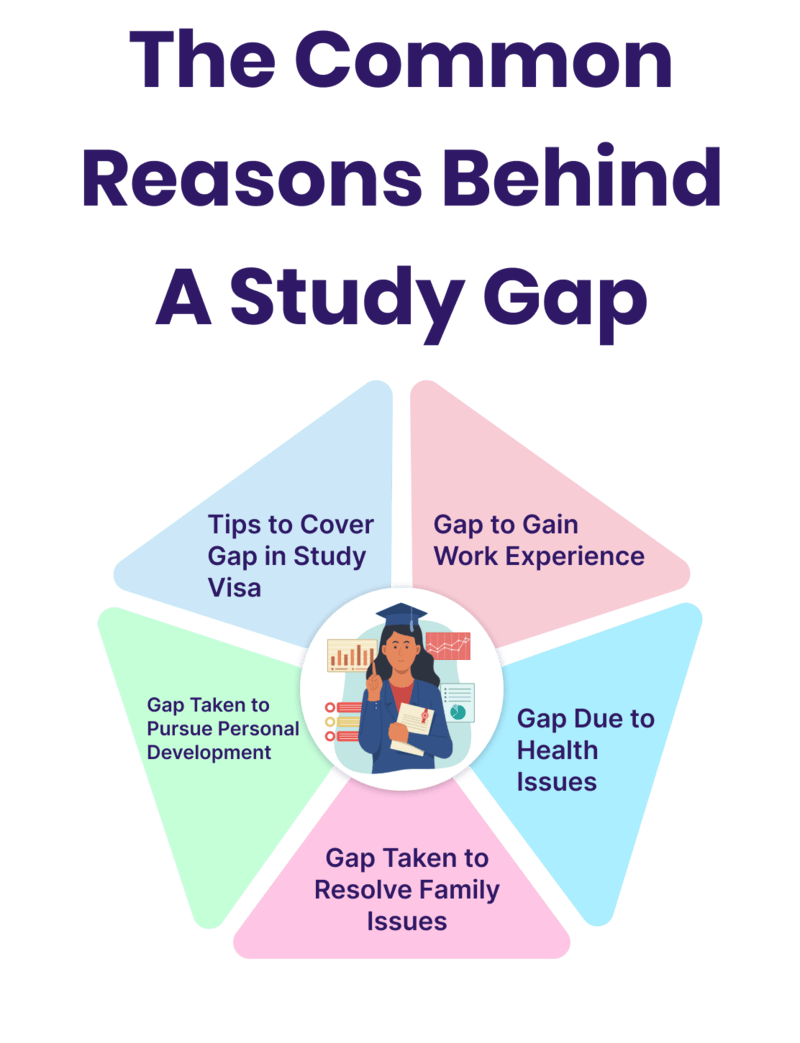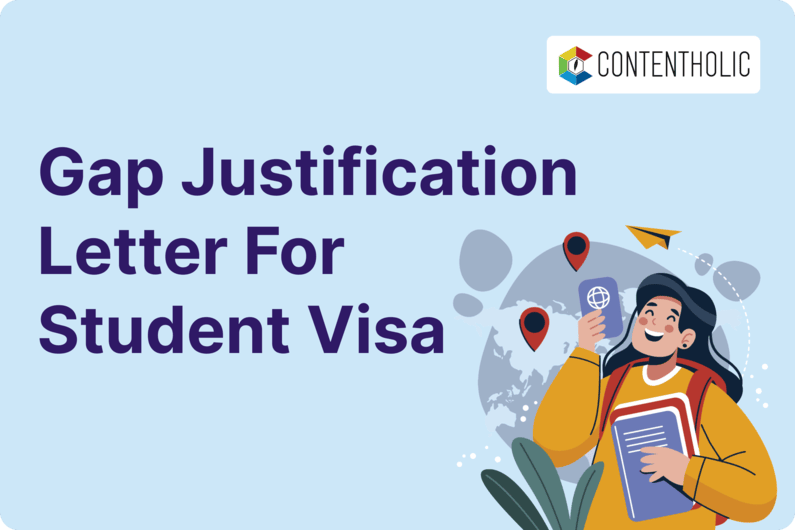When you are a student, you are expected to have a continuous education, one stage after another. However, certain circumstances might lead you to take a break in your academic years. When it comes to applying for a student visa, most country asks for a Statement of Purpose (SOP) which outlines your educational and professional background, your motivations behind the current chosen course or university, your financial situation, and ties to your home country. In this SOP, if there are any gap years in your academic or professional journey, then you need to justify it by providing reasons for the same.
To clarify, a study gap is a period between a student’s previous academic qualification and the program they enrolled in after this period. For example, the gap could be between after completing high school and going for an undergraduate degree, or other higher education levels such as Master’s or PhD degrees. To justify your gap years you need to submit a gap justification letter for a student visa. Whatever might be the reason, whether family issues or health concerns, writing about it can be complicated, and you might find it difficult to choose the right words. The main purpose of the gap justification letter is to turn the gap into a positive outlook toward your personal growth, determination, and resilience. In this blog, we will walk through what kind of gaps students usually face and how to justify those gaps in an SOP for student visa application. Moreover, we will explore how SOP writing services in India like Contentholic can help in writing a positive gap justification letter and a compelling SOP.
The Common Reasons Behind a Study Gap
1. Gap to Gain Work Experience
Sometimes, and this happens often after completing their undergraduate studies, students take a break to gain some practical work experience, especially if they think they lack some skills or understand the market demand before venturing into further studies.
Justification: This is a gap that can have the most positive justification, as students can easily say that the gap was to build their professional experience which can come in handy in their current chosen program. This justification is especially useful if the students are going for a field in business management, computer science, or engineering.
2. Gap Due to Health Issues
Health issues can be related to either physical or mental health. Sometimes academic stress along with some personal circumstances can make it paramount to take some break for your mental peace. In terms of physical health, the students usually take gaps if they have faced any long-term illness, surgery from which it could take some time to recover, or any other health-related issues if they require a significant time to heal.
Justification: In this case, just the mere mention of your health problems would not suffice. You can also add about how you spent your recovery time and how this time gave you a better chance to prepare more thoroughly for your next academic ambition.
3. Gap Taken to Resolve Family Issues
A student might face some familial issues or a family member may need the support or care of the student. Family obligations can range from taking care of a sick member to financial difficulties due to which a student cannot pay for the tuition and living expenses, or the student’s choice of supporting the family business for a short time.
Justification: This gap can be justified by highlighting the student’s sense of responsibility and readiness to help the family in times of crisis, turning it into a positive outlook toward the student’s overall personality. This can also demonstrate the student’s capability to face future challenges in academics and life.
4. Gap Taken to Pursue Personal Development
Some students take a gap from academics just to explore different aspects of life other than just education. They might choose to travel and see different parts of the world, do some part-time or volunteer work, work on their entrepreneurial interests or ideas, or do some self-learning such as preparing for competitive exams.
Justification: This type of gap can be difficult to explain. Students can turn this gap in their favor by talking about their experiences in this gap, how it provided them with skills, how the volunteering work has made them more mature, and how the travel led them to self-discovery or the global outlook. Connect any of these things with the current demands of the program and how they will help in further academic goals.

Tips to Cover Gap in Study Visa
Students often face a visa rejection when a clarification about the study gap is not properly addressed. Therefore, it is vital to convince the immigration officer that you have spent your gap years productively and are genuinely interested in continuing your studies. The SOP for student visas is one of the key documents to justify this gap.
Do not provide any false information or exaggerated details about the gap years. An honest account will make your SOP more authentic and the transparency can work in your favor. It is equally important to talk about how you spent the time in the gap years. Talk about the experience you gained, any skills you worked on, and how they helped you to decide about your future and the course of study to take.
How Contentholic Can Help You?
Writing a convincing SOP for a student visa that effectively justifies a study gap can be challenging. This is where Contentholic, a leading SOP writing agency, can help you. With years of experience and expertise in crafting personalized SOPs, Contentholic makes sure that your SOP not only justifies your study gap effectively but also puts a spotlight on your strenghts, motivations, and preparedness for the course.
Their team of professional SOP writers works closely with the students to understand their academic backgrounds, career goals, and personal experiences, ensuring that each individual’s unique story is shown through the SOP. Contentholic has earned a reputation for developing excellent and compelling SOPs for successful visa approval.
Conclusion
For students who have a gap in their studies, it is critical to provide a gap justification letter when applying for a student visa. You need to be honest and transparent and relate these gaps to your decision to study further by showing your willingness and resilient attitude towards not stopping your desire for higher education. This way a study gap can be turned into a positive aspect of your application. An effective SOP is the key to justifying the gaps, and with the help of an SOP writing services agency in India, like Contentholic, you can have an impactful SOP which can boost your chances of securing a student visa.
FAQs Related to Gap Justification Letter for Student Visa
1. What is a gap justification letter for a student visa?
A gap justification letter for a student visa is a document that justifies any academic gaps you had when applying for a student visa. This justification assures the visa officer that you have some genuine reasons behind taking a break from your education and are willing and committed to pursue your studies.
2. What is included in a gap justification letter?
First of all, the reasons behind the gap, how you spent the gap years, what you learned during that period, how it positively influenced your decision to study further, and a reassurance that you are fully committed to your studies.
3. What are some common reasons behind a study gap?
Students often take study gaps due to health issues, financial constraints, to gain some work experience, for personal development, or any other personal reasons.
4. Can I put personal reasons in my justification letter?
Yes, especially if they were of significance behind your study gap. But do not go too much over details, focus more on how you overcame them.
5. How can I make my academic gap into a positive outlook?
You can talk about the skills you developed, any volunteering work or internship, or any personal project you took that helped you experience positive growth in your life and showcase your continuous adaptability and desire to learn.






